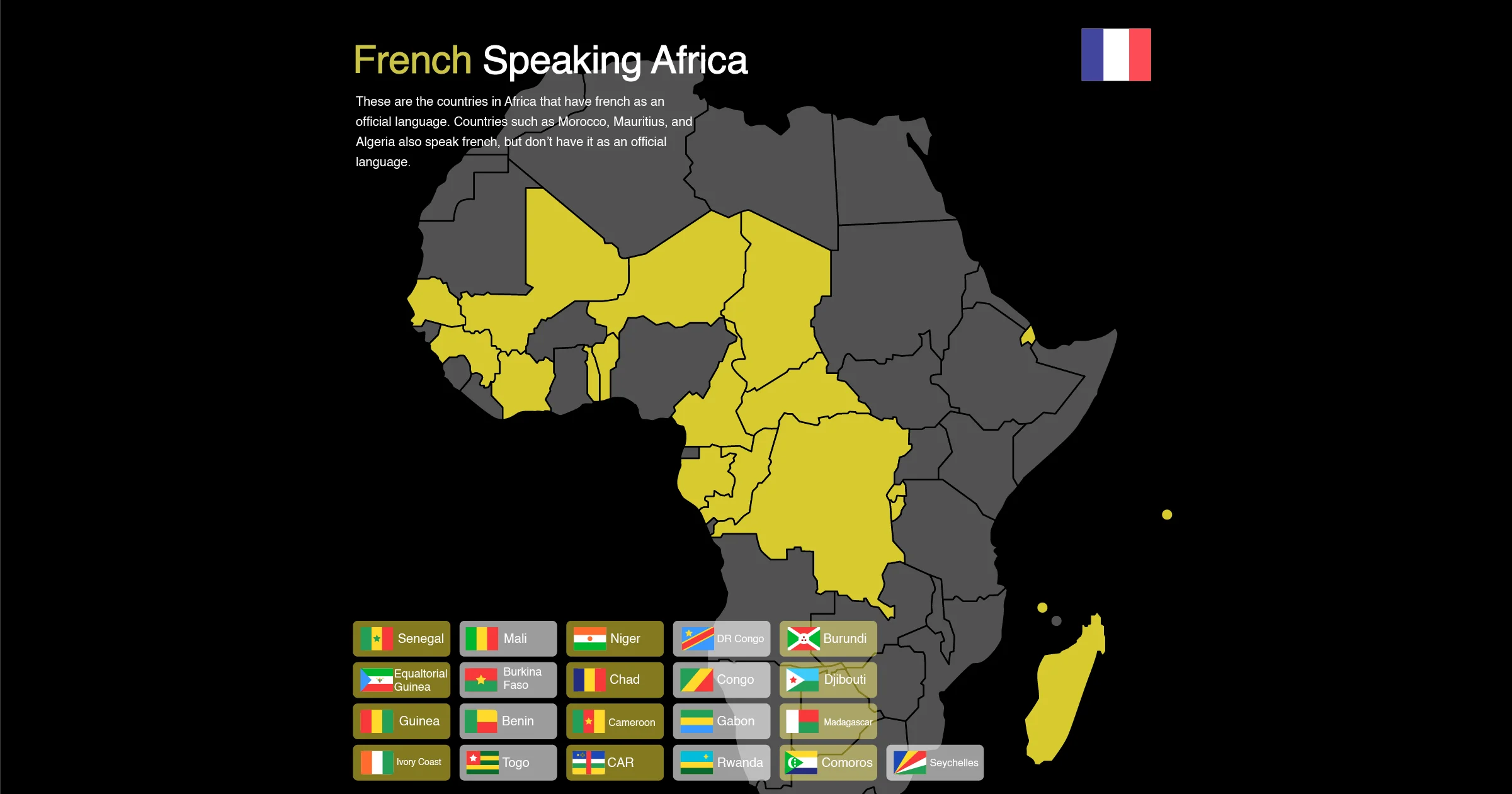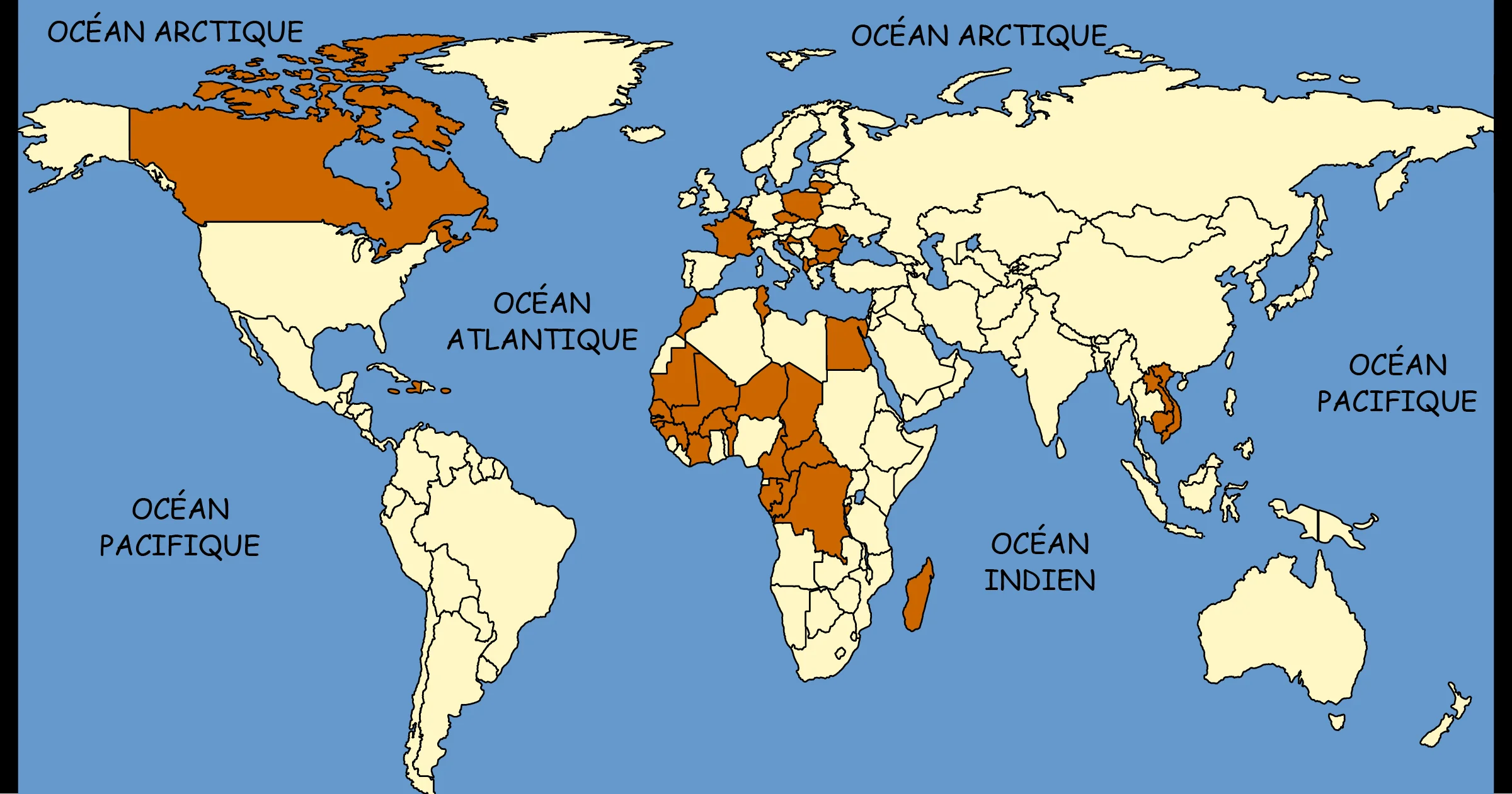Which Countries Speak French? A Guide for Global Business
French is not just a beautiful language; it’s the fifth most spoken language in the world with over 300 million speakers across multiple continents. Its significance goes beyond France, bridging cultures and connecting communities, making it essential for businesses looking to expand their reach and cater to a diverse, French-speaking audience.
As a result, there is a growing demand for French translation services and this highlights the need for effective communication in this rich linguistic tapestry. In this blog post, we will reveal the countries that speak French and explore those where French is an official language and the language history.
Get ready to deepen your understanding of this global language and the communities that thrive within it!
Countries Where French Is an Official Language
French is an official language in 29 countries across five continents, making it a truly global language. This status means French is formally recognized for government, education, and communication, showcasing its importance as a bridge between diverse cultures, economies, and business opportunities.
Regional Breakdown: 29 Countries Where French Is Official
Europe
French holds official status in several European countries, reflecting its historical and cultural influence:
- France
- Belgium
- Luxembourg
- Switzerland
- Monaco
Africa
Africa is home to the largest concentration of French-speaking countries, a legacy of colonial history and a testament to its linguistic significance:
- Benin
- Burkina Faso
- Burundi
- Cameroon
- Central African Republic
- Chad
- Comoros
- Congo (Republic)
- Democratic Republic of the Congo
- Djibouti
- Equatorial Guinea
- Gabon
- Guinea
- Ivory Coast
- Madagascar
- Mali
- Niger
- Rwanda
- Senegal
- Seychelles
- Togo

North America
French plays a significant role in North America, particularly in regions with strong historical connections to France:
- Canada (specifically in Quebec and parts of New Brunswick)
- Haiti
- Oceania
This global reach requires understanding the regional significance of French so you can help tailor strategies for effective communication and engagement in French-speaking countries.
Detailed Overviews of Key French-Speaking Markets
France: The Origin of the French Language
France, the birthplace of the French language, is a cultural and economic powerhouse with over 67 million people, primarily native French speakers. As the world’s seventh-largest economy, it is a hub for industries like fashion, technology, and tourism.
Businesses targeting this market must understand the nuances of the French language and culture to build trust and connections effectively with a large number of French speakers.
Canada: A Bilingual Nation with a French Heart
Canada’s bilingualism, with French and English as official languages, creates a unique market for businesses. French is vital in Quebec, spoken by 85% of the population.
With over 7 million French speakers in Canada, businesses should prioritize quality French translations and culturally sensitive localization, especially in Quebec’s region where French remains official and important for daily business.
Belgium and Switzerland: Multilingual Markets with a French Core
In Belgium, French is one of three official languages, mainly spoken in Wallonia and Brussels, making it vital for local businesses. You can read more about languages spoken in Belgium, including Dutch and German, and their significance in different regions of the country.
Switzerland also recognizes French as one of its four national languages, particularly in the western cantons like Geneva and Lausanne. Both countries’ multilingualism necessitates that businesses adapt to regional language preferences.
Democratic Republic of Congo, Ivory Coast, Senegal: French as a Lingua Franca in Africa
In the Democratic Republic of Congo, Ivory Coast, and Senegal, French serves as a vital lingua franca, facilitating communication among diverse ethnic groups with varying native languages.
Democratic Republic of Congo: As Africa’s second-largest country, French is essential for navigating its vast market, making high-quality translations crucial for business communication.
Ivory Coast: With its booming cocoa industry and tech sector, French is the primary business language, vital for companies entering this market.
Senegal: French, as the official language, plays a key role in industries like agriculture, mining, and tourism, requiring accurate translations for effective engagement.
From France’s economic leadership to the role of French as a lingua franca in African republics, the French language connects diverse regions and industries. Businesses entering these key markets must prioritize professional French translation and localization services to ensure clear, culturally accurate communication and build trust across French-speaking audiences.
Countries with Significant French-speaking Populations
Countries that speak French extend far beyond the borders of countries where it holds official status. It is spoken as a minority language or due to historical influences in many nations, creating opportunities for businesses to connect with diverse French-speaking populations worldwide.
North Africa: Morocco, Algeria, Tunisia
In North Africa, French has significant cultural and linguistic influence due to colonial history.
- In Morocco, it serves as a second language in business, education, and government.
- Algeria has a large French-speaking population, using French in education and commerce alongside Arabic.
- In Tunisia, French is commonly used in professional and academic settings, important for business communication.
Southeast Asia: Vietnam, Laos, Cambodia
French influence in Southeast Asia comes from its colonial history in the 19th and 20th centuries.
- In Vietnam, French is taught in schools and used in cultural contexts.
- In Laos, it persists in government and education, especially among older people.
- In Cambodia, French remains a minority language used in academia and some government institutions.
Middle East: Lebanon
In Lebanon, French is culturally and historically significant. It is widely spoken in education, media, and business, with many schools teaching it alongside Arabic. French also plays a key role in professional and diplomatic contexts.
United States: French-Speaking Communities
The United States has notable French-speaking communities, mainly in Louisiana and Maine, reflecting its cultural diversity. In Louisiana, French Creole and Cajun French stem from colonial heritage, while Maine’s French speakers are influenced by its proximity to Quebec.
Understanding the demographics of countries that speak French is crucial for businesses, as French plays a key role in education, trade, and diplomacy. Tailoring marketing content to these populations can enhance connections and expand global reach.
But have you ever considered how the French language emerged in these regions?
History and Spread of the French Language
The French language originated from Vulgar Latin spoken during the Roman Empire. As the empire expanded into Gaul (modern-day France), Latin blended with local Celtic and Germanic languages, evolving into Old French by the 9th century. This evolution led to modern French, which became prominent globally.
During the Middle Ages, French replaced Latin as the lingua franca of scholarship, diplomacy, and culture in Europe. By the 17th and 18th centuries, influenced by the French monarchy and Enlightenment thinkers, it established itself as the dominant language of educated Europe, associated with refinement and intellect, impacting diplomacy, science, literature, and the arts.
French colonialism significantly spread the French language, especially in Africa, Asia, and North America.
- In Africa, it became the administrative and educational language in nations like Senegal and the Democratic Republic of Congo, serving as a lingua franca.
- In Asia, French influenced Vietnam, Laos, and Cambodia during colonial rule, influencing education and governance.
- In North America, early exploration led to French becoming established in Canada and Louisiana, notably impacting Quebec and New Orleans.

Even after these regions gained independence, the French language maintained its relevance, evolving into a key tool for cultural and economic exchange.
The Organisation Internationale de la Francophonie (OIF) promotes the French language and culture globally, representing 88 member states and governments. It fosters cooperation among French-speaking nations, supports cultural preservation, and encourages the use of French in education and diplomacy.
“La Francophonie” reflects a commitment to linguistic diversity and cultural exchange, emphasizing the enduring significance of French, shaped by its history from Vulgar Latin to its role as a lingua franca. The work of organizations like the Internationale de la Francophonie ensures that French remains a vital global language.
Practical Implications for Businesses Targeting the French-Speaking Market
Even in countries with strong English skills, professional French translation and localization are essential for effective communication. French-speaking audiences appreciate businesses that honor their language and culture, as this builds trust and commitment.
Generic or poorly translated content can alienate potential customers, while high-quality translation establishes credibility and fosters connections.
French is not uniform; it features regional variations and dialects essential for localization. For instance, Canadian French differs from European French in vocabulary and tone, necessitating tailored messaging for Quebec.
In African French-speaking countries, local expressions and cultural influences are vital for effective communication. Adapting to these differences enhances the customer experience.
To respect the audience’s identity, content should reflect local cultural preferences, making businesses more relatable. Investing in professional French translation services and localization can help companies effectively engage French-speaking markets, building trust and a competitive edge.
Laoret: Your Trusted Partner for Global Language Solutions
In conclusion, effective communication in multiple languages is essential as the global landscape evolves. French, being widely spoken and a key working language underscores the need for professional translation and localization services to engage diverse audiences.
At Laoret, we offer comprehensive support in over 120 languages across all industries. Whether you’re targeting French-speaking markets or need assistance in other languages, our expert team can help you navigate cultural nuances and bridge communication gaps.
Contact us today to break language barriers and enhance your presence in the international marketplace!






